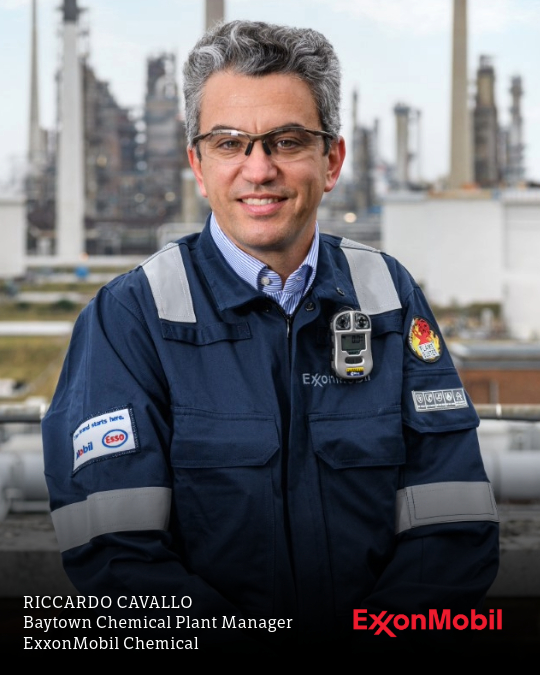SAFETY IS THE PRESENCE
OF HEALTHY SAFEGUARDS
BY RICCARDO CAVALLO
“It can’t happen here” are the most dangerous words in our industry. Throughout my career at ExxonMobil, I have witnessed thousands of highly complex jobs executed safely and with precision. But I have also experienced a couple days where only sheer luck prevented catastrophe.
One of the most profound moments in my career occurred in Augusta, Italy, where a vapor release came within six seconds of becoming an extremely serious incident. Although no lives were lost, the event left deep emotional scars on those involved and fractured the trust of the surrounding community – an impact the site is still working to rebuild today. Some of my colleagues, including close friends, left their jobs, unable to cope with the emotional toll.
This experience reinforced a lesson I will never forget: nothing is more important than effectively managing process safety risks. And it must be measured by the effectiveness of our safeguards, not merely by the absence of incidents.
At ExxonMobil, safety isn’t just a priority – it’s a core value. As the ExxonMobil Baytown Chemical Plant Manager, I play a critical role in translating this value into execution, ensuring the protection of our people, the environment, and the community in which we operate.
In recent years, we launched an effort to continue to improve our performance, called ‘Enhanced Process Safety’ (EPS), based on four key principles:
• OPERATIONS INTEGRITY MANAGEMENT SYSTEM (OIMS): This framework is our foundation. It establishes common worldwide expectations to address the risks inherent to our business, including personnel and process safety, security, health and environmental performance. It helps our leaders to focus on the intent of the different requirements, but also the “why” behind them. This, in my mind, is critical: we want to drive commitment, not compliance to requirements.
• PROACTIVELY MANAGE MAJOR HAZARD SCENARIOS: Each leader at ExxonMobil understands the major hazards in their area. For each of these hazards, we have identified the necessary safeguards – and how to respond if an incident were to occur. For accountability, there is a clear owner for each scenario and each safeguard and processes are in place to ensure sustainability.
• HUMAN PERFORMANCE: People make mistakes, which are often from well-meaning behaviors intended to get the job done. Understanding “how” and “why” mistakes occur can help us prevent them. How we, as leaders, respond to mistakes directly impacts the culture we are trying to create.
• LEARNING FROM EXPERIENCE: No one wants an incident or a “near miss” to happen. But if they do, we owe it to our people to learn from those incidents. Instead of “It can’t happen here,” as leaders, we need to ask the questions “How could it happen here?” and “How can we prevent that?”
The EPS initiative has seen great success since it was launched in 2018, achieving more than a 50% annual reduction in process safety incidents across all of our facilities globally.
However, we must never become complacent. We need to continuously learn both internally and externally to enhance our performance and cultivate a safety culture that emphasizes not only what safeguards are in place but also why they are essential for effectively managing process safety risks.
On the personnel safety side, our goal is “Nobody gets hurt,” which means working in a place where there are no life-altering injuries or fatalities. At Baytown this year, we are launching our new corporate Personnel Safety Management System (PSMS). PSMS was developed through significant external consultation with various companies and universities. What is evident is that the behaviors and actions that cause life-altering injuries are covered by the Life-Saving Rules and Actions (standardized through IOGP).
Focusing on sustaining the health of those safeguards every day, every task, leveraging the EPS principles, can lead us to avoid all life-altering injuries and fatalities. At ExxonMobil and at Baytown, we, I, will not rest till we achieve this outcome.
Safety should be measured by the effectiveness or health of our safeguards, not merely by the absence of incidents. To me, this is what “safety is a core value” truly means. With each of us embracing these principles, I hope we can work towards a safer future for everyone.

